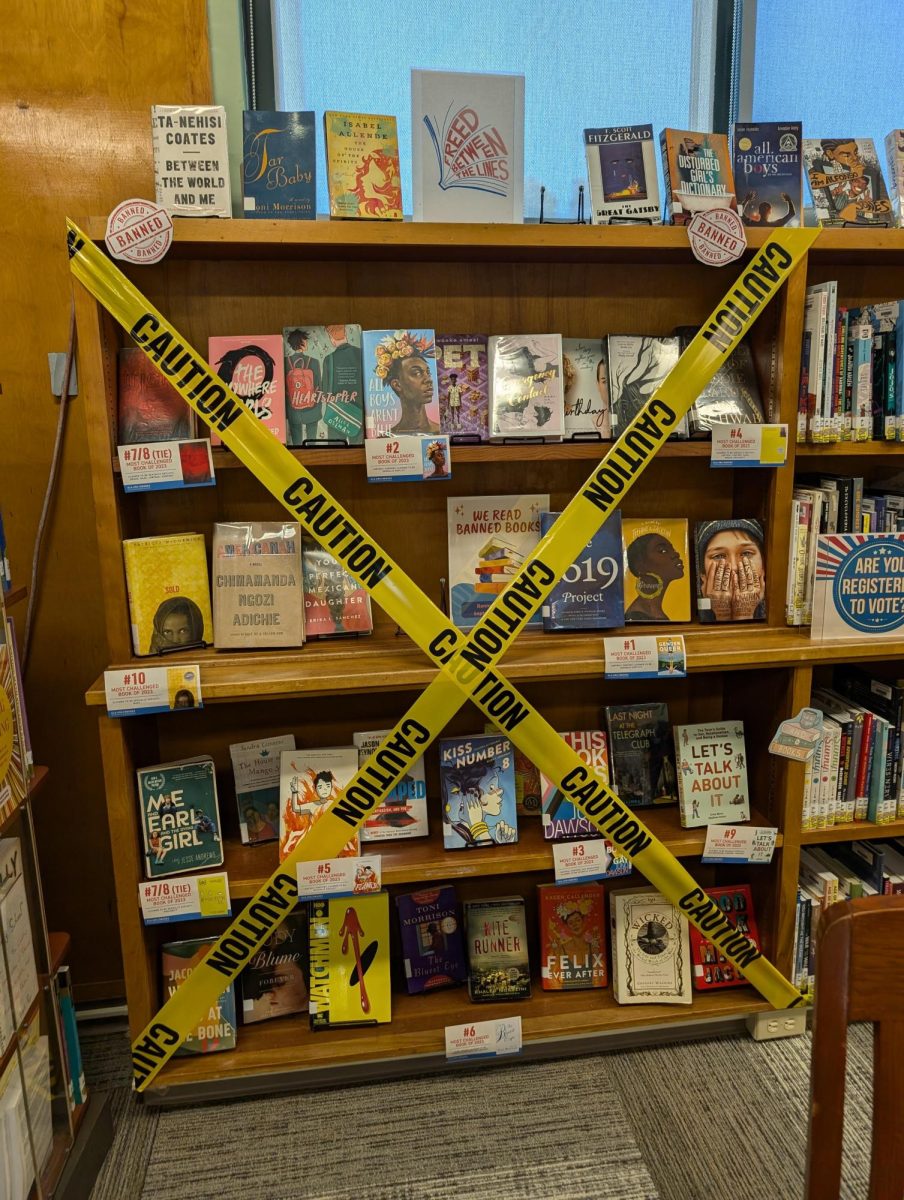Since Flintridge Sacred Heart Academy’s inception in 1931, rare instances of book banning in California have tested FSHA’s commitment to Veritas, the pursuit of truth. By consistently reinforcing its pledge to Veritas, however, FSHA has successfully resisted pressure to ban books and fostered a culture of intellectual freedom on the Hill.
In the late 1930s and early 1940s, Kern County, California banned John Steinbeck’s depression-era masterpiece The Grapes of Wrath, citing concerns that it villainized the residents of Kern. In contrast, an article about one sister’s address to the Sodality from an archival December 1945 edition of the Veritas Shield suggests that FSHA’s leaders were already prioritizing intellectual freedom.
“Sister [Louise] stressed books as one of the most important factors in the young woman’s education,” reads the article, “Sister also pointed out that… Now, while good… books are at their disposal, it is not only [students’] privilege but their duty to develop themselves in such a manner as to ensure their future.”
However, the pull of censorship on FSHA is evident in the article.
“[Sister Louise] brought out the fact that… bad books produce a poor or poisonous mind,” it continues, “[She] also emphasized the underlying evils in the so-called ‘comics.’”
Despite Sister Louise’s words, there is no evidence that FSHA banned any books in response to Kern County’s ban on The Grapes of Wrath or the perceived dangers of comic books. Unfortunately, more tests of intellectual freedom followed.
During the 1960s, all of Ernest Hemingway’s books were withdrawn from schools in Riverside County after complaints of obscenity. From 1989 to 1991, the books I Know Why the Caged Bird Sings and The Catcher in the Rye were also removed from Benning and Boron California schools after outrage over the novels’ mature themes. Across these tides of censorship, FSHA appears never to have banned any of the aforementioned books.
The hyper-polarized 2020s spurred book bans even closer to home. In December 2020, the Burbank Unified School District removed several classics from its instruction including To Kill A Mockingbird, The Adventures of Huckleberry Finn, and Of Mice and Men, fearing that the books’ outdated language might trigger students. At FSHA, administrators and teachers faced the difficult question of whether to follow suit.
“We had an outside educator come in to talk about the harm of teaching a book with the N-word in it,” recalls FSHA principal Ms. Rebecca Bostic.
According to Ms. Bostic, the educator suggested that FSHA retire books with racist themes from the English curriculum. Ultimately, however, the English department opted to continue teaching controversial books alongside a commitment to racial awareness.
“That’s that balance of intellectual freedom,” said Ms. Bostic, “We trust a teacher of good will to teach a text that has potentially complicated or emotionally weighted ideas.”
The English Department’s current policy on text selections outlines its dedication to give “reading literature a safe haven even… when it meaningfully offends our tastes, sensitivities, and social mores.” It reinforces that books are chosen “with the most deeply held concern for our students’ well-being and learning.”
The Library’s selection policy, too, maintains the library’s commitment to “facilitate this pursuit of Veritas.” It also includes, however, a section on “Reconsideration Procedures” detailing the process by which a book may be removed from the library. According to librarian Ms. Katherine Eisenstein, this section is rarely used.
“Since I have been here, there have been no book challenges,” said Ms. Eisenstein, “Because [maintaining access to books] does align with our mission, I feel more protected by the administration.”
Currently, hundreds of books are still banned in states such as Florida, Tennessee, and Texas for their explicit discussions of race, sexuality, and gender. In the FSHA library, meanwhile, prohibited texts were recently honored with a display for Banned Books Week next to a proclamation that “We read banned books!”
The display, which featured novels such as All Boys Aren’t Blue alongside vintage copies of the Bible, captured the astounding extent of censorship across American history. From Kern County’s 1939 ban of The Grapes of Wrath to Burbank School District’s 2020 removal of To Kill A Mockingbird, Flintridge Sacred Heart has faced many waves of intellectual suppression. Guided by its Dominican values of study, however, FSHA has continuously protected intellectual freedom on the Hill. In doing so, it has also created a refuge for free thinkers- a place where book banning is something students only read about.


